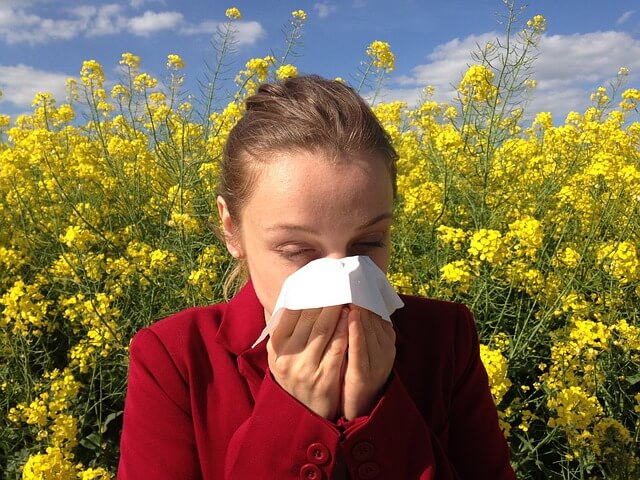If you're one of the millions of people who suffer from spring allergies, you know how miserable they can be. The itchy eyes, the runny nose, the sneezing…ugh! It's enough to make you want to stay inside all season long. But don't worry – we've got you covered. In this blog post, we'll discuss 10 natural remedies for spring allergies that actually work! So read on and find out how you can finally get some relief.
Causes of Spring Allergies
Spring allergies get their name from allergens. These are like triggers that can cause symptoms, like coughing, sneezing, runny nose, headaches, and even nausea.
The allergens can be a little different depending on the season. Here are some of the most common ones, especially in the spring and summer months:
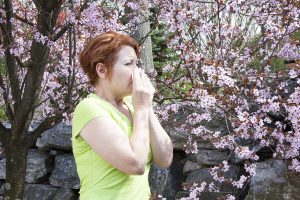
Pollen
The new plant bloom that appears during springtime turns out to be one of the most significant contributors to allergies. This happens because, during this time, plants produce high quantities of pollen.
Pollen is created by plants as a part of their reproductive system. As the pollen flies through the air, it lands on other plants and fertilizes them. Unfortunately, some people have allergic reactions to such dense concentrations of pollen.
When some people come in contact with the airborne pollen, their immune system interprets the presence of the pollen as an invasion. This can cause the body to launch an attack. It also releases hormones that trigger the effects you feel when you are sick.
Insects
There are also insects that can trigger an immune reaction.
Proteins that make up the exoskeleton of insects like dust mites are recognized by the body as a pathogen. If you breathe or come in substantial contact with those types of insects or their fecal matter, then your histamine levels will skyrocket.
Insect-related allergies are relatively common, but many people don’t know that they’re experiencing them. The most common type of insect associated with allergies is dust mites.
Dust mites feed on skin cells that collect around your bedding, carpet, and upholstery.
Insect allergies cause many similar reactions to pollen allergies. These can include breathing issues and even skin irritations. It primarily comes down to the level of exposure.
Mold
Another very common cause of allergy is mold.
Molds can grow anywhere there is a buildup of moisture. So, as the months become warmer, molds can develop in hidden places around your home. These molds create spores that can get into your lungs and cause irritation. In some cases, molds can even be quite dangerous and require special treatment to get rid of them.
Some molds are relatively harmless, but most heavy amounts of mold can cause irritation in the throat and nasal area. Companies now offer mold test kits that allow you to see what types of mold are present in your home.
Spring Allergy Symptoms
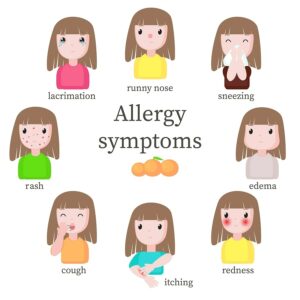
Not sure if what you are experiencing is allergies? There are common signs and symptoms of an allergy attack, but some of them can also occur with other illnesses. It is more about a combination of symptoms, and not having signs of illnesses like the cold or flu, that might point toward allergies.
Some of the more common symptoms of seasonal and spring allergies include:
- Watery eyes
- Itchy skin or eyes
- Runny nose
- Stuffy nose
- Sneezing
- Ear problems
- Itchy throat
- Rash
- Cough
These are the signs most people think of when they think of allergies. Yet, others might have more symptoms, including:
- Headaches
- Dizziness
- Nausea or vomiting
Getting a Diagnosis
Allergies are often a mild condition to deal with, and definitely a common one. But, it is still a good idea to see a doctor if you are just not sure if what you’re dealing with is actually from seasonal allergies.
Important – If you have painful rashes or trouble breathing, seek medical attention right away.
10 Natural Remedies for Spring Allergies
The good news is that there are many natural remedies for spring allergies.
Here is a look at the main methods for treating spring allergies and allergy symptoms:
1. Mucus Reducing Diet to Relieve and Manage Seasonal Allergy Symptoms
Take a diet that reduces mucus in your body. In Ayurveda, this is referred to as a Kapha-reducing diet. It is best to avoid cold, heavy foods and drinks, including dairy, wheat, meat, sugar, processed foods. These foods slow down digestion and dampen your digestive fire.
A Kapha reducing diet suggests you eat a warm, light, cooked foods that are easy to digest. Focus on organic vegetables and fruits. Cook the vegetables with a bit of clarified butter (ghee) or olive oil to soothe the mucous membranes.
2. Cleansing and Detoxification

Our bodies naturally detoxify via the skin, lungs, liver, lymph, and kidneys. But when there is an overload, allergies arise.
Doing a liver cleanse can help you clear toxins from the body. As a result, your liver and detoxification pathways are better able to perform their job and reduce the load on the immune system.
How To Detox Your Liver in 10 Days
3. Improve Digestion
Many people suffer from digestive problems like gas, bloating, stomach discomfort, heartburn, and constipation after eating.
Your digestive system and immune function are linked, so put some attention to improving your digestive health, which can bolster your immune health. Be sure to use spices in your cooking to aid digestion like black pepper, ginger, cinnamon, cumin, cayenne, and turmeric.
4. Eat Fruit with High Vitamin C
Fruits with high vitamin C can also help with allergies.
Citrus, kiwi, kale, broccoli, Brussel sprouts, and papayas are known to have high levels of vitamin C.
5. Do a Deep House Cleaning
Don't underestimate the power of a clean home. Things simply get dirty over time and need attention. When your home is unclean for too long, it's easy for allergens to build up and cause your irritation.
Once you spend some time getting rid of dust and film in your home, you may notice improved air quality.
6. Air Filters

Improve the quality of your indoor air so you can breathe the cleanest air possible. Replacing your air filters with HEPA filters so that you can have a more efficient ability to filter pollen out of the air system of your home.
7. Close Your Windows During the Day
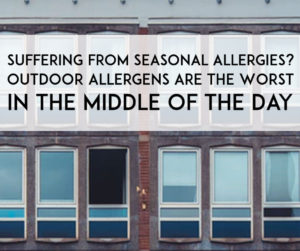
It’s great to have a lot of fresh air in your home, but letting particles in your home can cause you irritation. Once inside they can land in hard to reach areas and continue to cause symptoms.
People often find that keeping the windows closed during spring can help reduce the amount of pollen coming into the home… Especially during later times in the day.
8. Use Eucalyptus in the Shower
Eucalyptus contains menthol, which is famous for helping people clean their sinuses. Try hanging a branch of Eucalyptus in the shower for a relaxing effervescent experience.
9. Change Clothes When You Get Home and Wash Bedding Often
It’s always a good idea to remove and wash your clothes as soon as you get home to get the pollen off of your body so that it doesn’t spread all over your home.
Vacuuming and washing bedding a weekly can help reduce both pollen and mites that could cause irritation. It's always a good idea to keep your bedroom clean and free of debris.
10. Use a Neti Pot
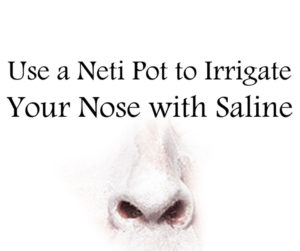
One of the best natural remedies for allergies is a Neti Pot.
The practice of using a Neti pot started centuries ago, specifically back to Ayurvedic practices.
Nasal irrigation opens up your sinuses and allows you to breathe much better. Whenever you use a neti pot, you purge irritants, microorganisms, and other allergens from your nasal passages.
You can learn more about Neti Pot and how to Use a Neti Pot here.
Essential Oils for Allergies
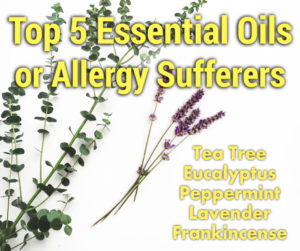
Tea Tree
Using Tea Tree oil can kill bacteria, mold, and fungi spores in your home. This amazing essential oil also has powerful antiseptic and anti-inflammatory properties. Use 5 drops of Tea Tree oil into a diffuser to kill allergens in the air and limit the growth of molds and other organisms. This will help you to combat allergy symptoms and give you a more restful sleep at night.
Eucalyptus
Known as an anti-inflammatory, Eucalyptus essential oil can help with your congestion. It opens the sinuses and improves circulation and airflow to reduce allergy symptoms.
Peppermint
Inhaling peppermint essential oil can naturally reduce inflammation and help to open the sinuses making breathing easier. Peppermint excels in its ability to be an expectorant by helping your body get rid of mucus and slow inflammation. It also helps to control muscle spasms caused by coughing.
Lavender
Lavender is one of the best oils for seasonal allergies because of its natural anti-histamine properties and excellent anti-inflammatory properties. It can help with skin rashes and irritation. One of the best things about lavender oil is that it can be used in the middle of an allergic reaction. Lavender is fantastic for fighting skin conditions like hives. And if you have bug bites you can use lavender to help soothe them.
Frankincense
Frankincense has powerful calming effects because of its ability to interact with the limbic system of the brain which is responsible for the function of the nervous system. This essential oil can fight agents that cause allergic reactions and it also works to reduce inflammation in the respiratory system.
Herbs For Seasonal Allergies
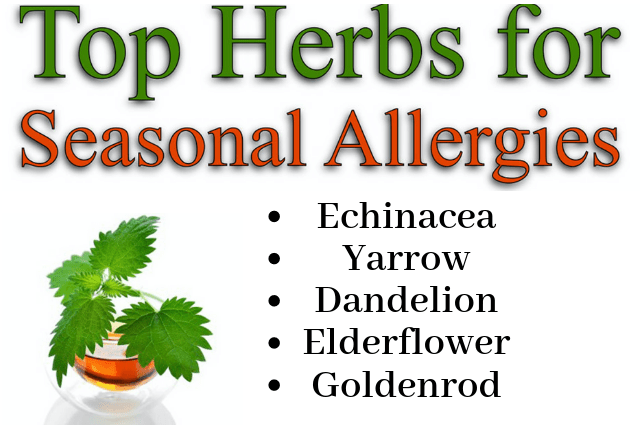
Echinacea
Yarrow
Dandelion
Elderflower
Goldenrod
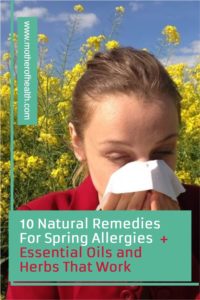

Don't forget to follow us on Pinterest. Thank you for your time and reading.

